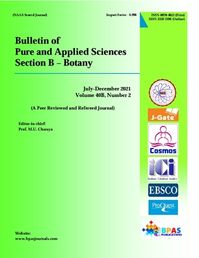Comparative Study of Estimation Methods for Efficient Extraction of Chlorophyll a and Carotenoids Using Different Solvents
DOI:
https://doi.org/10.48165/Keywords:
Algae, Spectroscopy, Solvents, Chlorophyll and carotenoids contentAbstract
Photosynthetic pigments chlorophyll and carotenoids are primary pigments in green plants and algae. These pigments have the potential to turn light energy into chemical energy. In this study, different solvents acetone, ethanol and methanol were used to estimate chlorophyll and carotenoids through UV-VIS spectroscopy from different algal species viz. Anabaena sp., Nostoc sp., Merismopedia sp. and Microcystis sp., Methanol solvent contain the eminent potential for extraction of plant pigments. UV VIS spectrum (300-800nm) gives the best detection spectrum to evaluate the efficiency of pigments with different solvents. Three methods were used to estimate the best efficiency for the extraction of chlorophyll and carotenoid pigments from algae cells. Results were recorded that Methanol > Ethanol >Acetone in the manner of extraction of plant pigments.
Downloads
References
Arnon, D.I. (1949). Copper enzymes in isolated chloroplasts: polyphenol oxidase in Beta vulgaris. Plant Physiol 24, 1–15.
Atwell, B. J., Kriedemann, P. E., and Turnbull, C. G. (Eds.). (1999). Plants in action: adaptation in nature, performance in cultivation. Macmillan Education AU. Search Google Scholar
Cadondon, J. G., Ong, P. M. B., Vallar, E. A., Shiina, T., and Galvez, M. C. D. (2022). Chlorophyll-a Pigment Measurement of Spirulina in Algal Growth Monitoring Using Portable Pulsed LED Fluorescence Lidar System. Sensors 22(8), 2940.
Dere, S., GUNES, T., and Sivaci, R. (1998). Spectrophotometric Determination of Chlorophyll-A, B and Total carotenoid Contents of Some Algae Species Using Different Solvents. Turkish Journal of Botany 22(1), 13-18.
Jeffrey, S. W., Mantoura R. F. C., Bjornl and T. (1997). Data for the identification of 47 key phytoplankton pigments, Phytoplankton pigments in oceanography: guidelines to modern methods. UNESCO Publishing, Paris, 10, 449–
Jeffrey, S.W., Humphrey, G.F. (1975). New spectrophotometric equations for determining Chlorophyll a, b, c1 and c2 in higher plants, algae and natural phytoplankton. – Biochem. Physiol, Pflanz.167, 191-194.
Lichtenthaler, H. K. (1987).Chlorophyll and carotenoids: pigments of photosynthetic biomembranes, In: PACKER, L. and DOUCE, R. eds. Methods in Enzymology. Washington, Academic Press, 148, 350-382.
Lichtenthaler, H. K., and Buschmann, C. (2001). Chlorophyll and carotenoids: Measurement and characterization by UV‐VIS spectroscopy. Current protocols in food analytical chemistry, 1(1), 4-3.
https://doi.org/10.1002/0471142913.faf0403 s01 F4.3.1-F4.3.8.
Lichtenthaler, H. K., and Wellburn, A. R. (1983). Determinations of total carotenoids and Chlorophyll a and b of leaf extracts in different solvents. Biochem. Soc. Trans., 11, 591–592.
Porra, R.J. (2002) The chequered history of the development and use of simultaneous equations for the accurate determination of Chlorophyll a and b. Photosynth Res. 73, 149–156.
Porra, R. J., Thompson W. A., Kreidemann P. E. (1989). Determination of accurate extinction coefficients and simultaneous equations for assaying Chlorophyll a and b extracted with four different solvents: verification of the concentration of Chlorophyll standards by atomic absorption spectrometry. Biochim Biophys Acta. 975, 384– 394.
Ritchie, R. J. (2006). Consistent sets of spectrophotometric Chlorophyll equations for acetone, methanol and ethanol solvents. Photosynthesis research, 89(1), 27-41.
Sartory, D. P., Grobbelaar J. U. (1984). Extraction of Chlorophyll a from freshwater phytoplankton for spectrophotometric analysis. Hydrobiologia, 114,177–187
Shankar, U., Lenka, S. K., Ackland, M. L., and Callahan, D. L. (2022). Comparison of different solvent extraction compositions for the analysis of phytoplankton pigments and lipids using a rapid and sensitive LC-MS method. https://doi.org/10.21203/rs.3.rs 1706520/v1
Stanier, R. Y., Kunisawa, R., Mandel, M. C. B. G., and Cohen-Bazire, G. (1971). Purification and properties of unicellular blue-green algae (order Chroococcales). Bacteriological reviews, 35(2), 171-205.
Stokes, G. G. (1864). II. On the supposed identity of biliverd in with chlorophyll, with remarks on the constitution of chlorophyll. Proceedings of the Royal Society of London, 13, 144-145.
Wellburn, A.R. (1994). The Spectral Determination of Chlorophyll a and b, as well as Total Carotenoids, Using Various Solvents with Spectrophotometers of Different Resolution, J. Plant Phys. 144, 307- 313.
Wright, S. W, Jeffrey, S. W., Mantoura F. R. C. (1997) Evaluation of methods and solvents for pigment analysis. In: Jeffrey SW,
Mantoura RFC, Wright SW (eds) Phytoplankton pigments in oceanography: guidelines to modern methods. UNESCO Publ., Paris pp 261–282.
